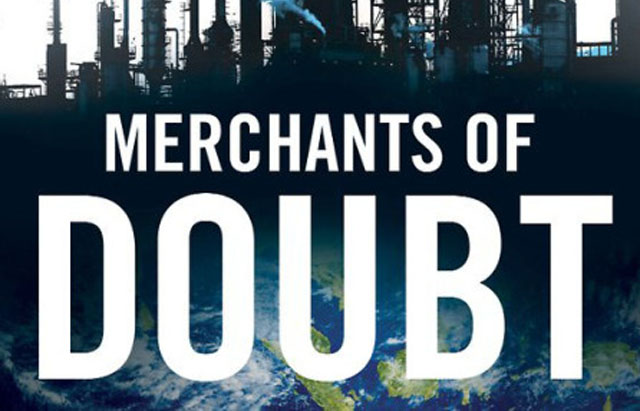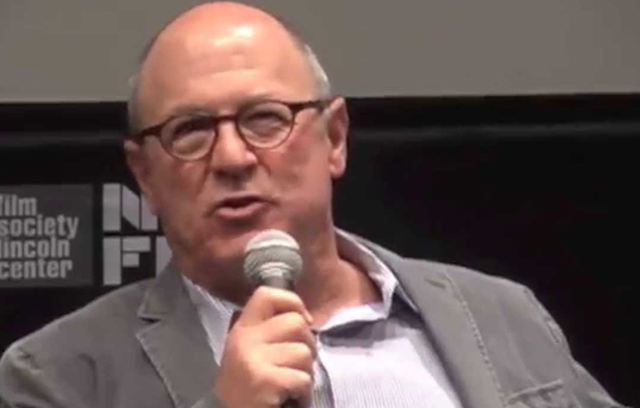CHICAGO– In the War on Truth, there is no more fertile battleground that the United States. As special interests and corporations continue to pour money into their agendas, the traditional information delivery systems – print, broadcast and the internet – are capitulating to liars for the sake of dollars and both-sides-do-it reporting. Director Robert Kenner profiles these “Merchants of Doubt” in his new documentary.
Focusing mainly on climate change and global warming, Kenner provides a background for the vocal minority who are absurdly against policies that will save the warming planet. Their loud voices turn out to be sourced from corporations and special interest groups whose purpose is to protect their profits. The information media, meanwhile, gives a forum to these anti-climate change voices, as if they are part of a legitimate debate. This information war are rooted in the fifty years that tobacco companies used manipulation to get a free pass, while selling a product that had the potential to kill their customers.

Creating Deception in ‘Merchants of Doubt’
Photo credit: Sony Pictures Classics
HollywoodChicago.com talked to director Robert Kenner – who also co-wrote the film with Kim Roberts – on the issues contained in the documentary, and the nature of persons who put their own monied interests ahead of the common good.
HollywoodChicago.com: 90% of the U.S. information industry is controlled through about six companies. In your opinion, how does the ‘group think’ of wagging the dog in these companies influence American policies domestically and abroad?
Robert Kenner: I can speak to that in a general sense. At some levels, I think ‘Merchants of Doubt’ is about the people who are printed in newspapers and go on television, and they are not being properly vetted as to who they represent. There is an appearance that these individuals are independent agents, when in fact they are being paid big bucks from the corporations to act as an expert on their behalf. Whether historically it’s big tobacco or the asbestos industry, and now with industries affecting climate change, the idea is to get these companies looking like they are taking reasonable measures with their product. The media is not doing their homework enough to find out who these ‘representatives’ are.
HollywoodChicago.com: How do these ‘Merchants’ manipulate certain demographics?
Kenner: I got a story from the ‘Winston Man,’ who like the Marlboro Man pitched for Winston cigarettes as a guys with adventurous activities. He told me that on the sets of the commercial shoots he would ask the tobacco executives if they smoked, and they would say, ‘no, that’s for poor people, African Americans and stupid people. We don’t touch it.’ These guys are out to sell a product, they don’t care who they sell it to – that sums up fifty years of cigarette marketing.
HollywoodChicago.com: America seems at a point in its history in which these ‘Merchants’ are pointing towards academics or intellectuals and calling them ‘elite’ and out of touch, and news consumers seem to be embracing that notion. Why is hating smart people an effective tool of propagandists?
Kenner: They hate anyone who is inconvenient, and gets in the way of their profit, and now scientists are the target. Exxon has it’s own internal scientists that know their is a problem with climate change, but they also fund the deniers. They will go after anyone, and their playbook is create delay, create doubt and attack the messenger.
HollywoodChicago.com: One of the most effective swayers of opinion, as highlighted in your film, is the simple statement ‘we don’t know.’ What is the psychology of those three words as an tool in creating doubt in the general population?
Kenner: It’s about the delay….’I’m not a scientist, we don’t know, there has to be more studies’…the status quo is their friend. Anything they can do to keep things the way they are, makes their job easier.
HollywoodChicago.com: The term ‘Orwellian’ is used to describe certain types of deflecting propaganda, mostly based on George Orwell’s novel ‘1984.’ What are the ‘Merchants of Doubt’ doing that George Orwell never even thought up?
Kenner: What got me interested in this subject initially is when I went to a oversight meeting on the labeling of cloned meat, whether the consumer should know. Someone representing the meat industry told the committee that it was putting too much of a ‘burden’ on consumers if the labeling were to occur. And I thought, who would say such a thing? I started looking up the names of these groups who provided these counterpoints, and it was names like ‘Citizens for Consumer Freedom.’ It felt like an Orwellian rabbit hole, with hundreds of these type of groups.
We also have these Merchants of Doubt who are very wealthy, but say that scientists are promoting their agenda, ‘just for the money.’
HollywoodChicago.com: It is said that the relative safety of Americans have improved in the last two generations, but the fear that is generated in society has increased. How to the ‘Merchants of Doubt’ use fear as a manipulator in creating an agenda?
Kenner: The buzz word for this is lack of ‘freedom.’ One tobacco executive admitted that if he wanted to stir up any kind of protest, he would have hired demonstrators carry signs that days their freedoms are being taken away. That is part of the fear factor, and they are repeated through the same playbook, it doesn’t matter what is being debated.

Director Robert Kenner Answers Questions at a Recent Screening of ‘Merchants of Doubt’
Photo credit: Sony Pictures Classics
HollywoodChicago.com: With the general dissolution of print media, and the new economy realizations for journalists and writers, where will the investigations – such as the one done by the Chicago Tribune in your film – come from, or will investigative journalism eventually die?
Kenner: Yeah, but we still sure do need it. I know that some papers have improved in calling some people out, and they have done as much as anyone in framing it as a debate. But in talking about carbon dioxide and global warming, that’s not a debate.
To your point, there used to be more journalists than public relations representatives, and now it’s the opposite. The people who might have investigated corporations, are now being paid to represent those companies. It affects our democracy…in these cases it takes two to lie, one to tell the lie and the media to report it. It’s sad that its happening, but hopefully we’ll find a balance.
HollywoodChicago.com: How has the internet changed the game for the Merchants of Doubt? Has it made it easier for them or more difficult, in your opinion?
Kenner: I think it’s just made it different. They were successful before in other media, so they can work in any modern communication outlet.
HollywoodChicago.com: With information manipulation to promote an agenda such big business, what do you recommend for a consumer of information to understand what is legitimate?
Kenner: As the magician in our film said, ‘once revealed, never concealed.’ As we start to see these lies being exposed, it doesn’t matter what your ideology is, people don’t like to lied to. When people start to hear the same things being said for each dangerous product or manufacturing method, and when the Merchants of Doubt are called out, then we can realize that these people are simply representing profit and trying to create doubt.
 | By PATRICK McDONALD |